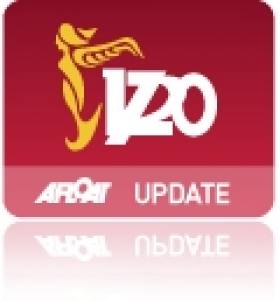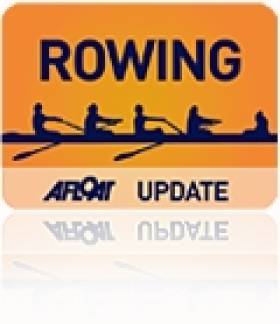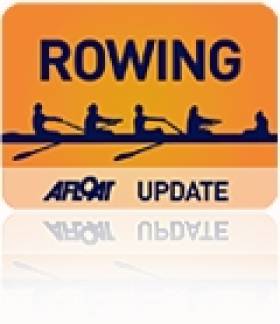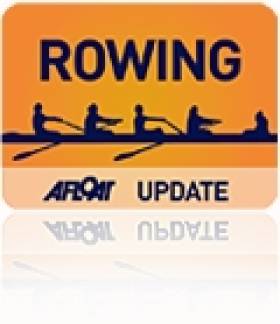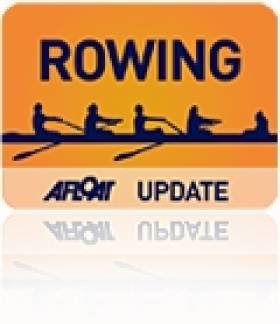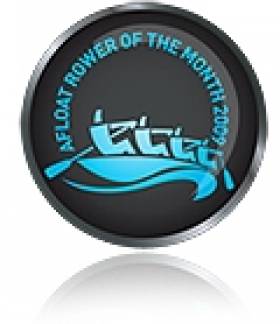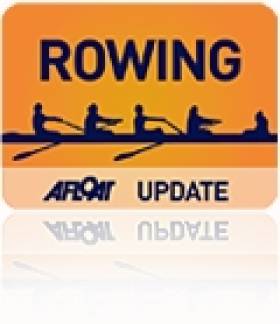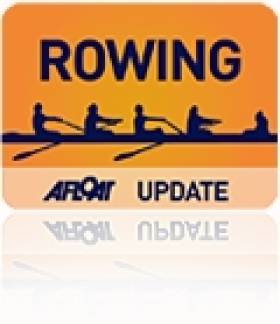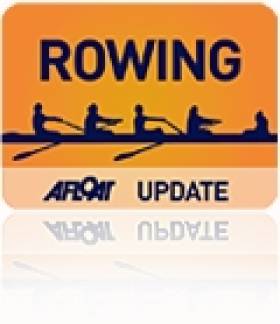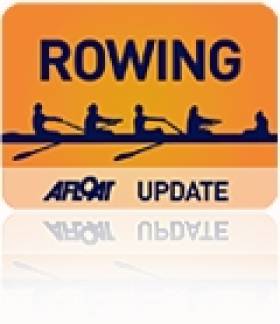Displaying items by tag: Dilleen
Ireland Double Win D Final and Walsh Takes Second in C Final in Aiguebelette
#Rowing: Ireland’s women’s double and lightweight single sculler Denise Walsh finished their campaigns at the World Rowing Championships in Aiguebelette in France with good performances. Walsh took second in her C Final, 14th overall. She sprinted to the line and almost caught winner, Kate Johnstone of South Africa. Helen Hannigan and Lisa Dilleen won their D final, pushing Italy into second. The Ireland crew places 19th overall.
World Rowing Championships, Aiguebelette, France – Day Six (Irish interest)
Men
Lightweight Four – Semi-Final Two (First Three to A Final): 4
Britain (2 P Chambers) 6:58.68.
Lightweight Pair – A Final: 1 Britain (J Cassells, S Scrimgeour) 6:29.40. B Final (Places 7 to 12): 1 Ireland (M O’Donovan, S O’Driscoll) 6:46.44, 2 Spain 6:46.59, 3 Czech Republic 6:47.54.
Single Sculls – Semi-Final Two: 5 Britain (A Campbell) 6:51.24.
Women
Four – A Final: 1 United States 6:25.22, 2 Britain 6:31.52, 3 China 6:35.56; 5 Ireland (A Keogh, M Dukarska, L Kennedy, B O’Brien) 6:43.49.
Double Sculls – D Final (Places 19 to 24): 1 Ireland (H Hannigan, L Dilleen) 7:17.04, 2 Italy 7:18.38, 3 Ukraine 7:21.82.
Single Sculls – Semi-Final (First Three to A Final; rest to B Final): 1 China 7:24.41, 2 Czech Republic 7:26.48, 3 United States 7:27.39; 5 Ireland (S Puspure) 7:33.94.
Lightweight Single Sculls – C Final (Places 13 to 18): 1 South Africa 8:07.16, 2 Ireland (D Walsh) 8:07.96.
Fifth Place In Lucerne Semi-Final for Ireland Double
#Rowing: The Ireland women’s double of Lisa Dilleen and Helen Hannigan finished fifth in their semi-final at the World Cup regatta in Lucerne today. Belarus and Germany took control of the race, with Greece moving in the third quarter to secure their place in the top three and nail down a place in the A Final. Italy could not progress beyond fourth and Ireland could not improve on their fifth place.
World Cup Regatta, Lucerne – Day One (Irish interest; selected results)
Men
Lightweight Pair – Repechage (First Four to A Final): 4 Ireland (M O’Donovan, S O’Driscoll) 6:50.28.
Women
Double Sculls – A/B Semi-Final (First Three to A Final; rest to B Final): 1 Belarus 7:14.98, 2 Germany 7:17.52, 3 Greece 7:19.13; 5 Ireland (H Hannigan, L Dilleen) 7:26.75.
Lightweight Double – A/B Semi-Final (First Three to A Final; rest to B Final): 1 South Africa 7:35.26, 2 US 7:36.79, 3 Germany 7:39.14; 5 Ireland (C Lambe, S Jennings) 7:44.11
Lightweight Single – Repechage One (Two to A Final; rest to B Final): 3 Ireland (D Walsh) 8:11.47.
Dilleen and Hannigan Show Fighting Spirit in Lucerne
# Rowing: Helen Hannigan and Lisa Dilleen showed fighting spirit in their heat of the double sculls at the World Cup Regatta in Lucerne in Switzerland. There were just two direct qualification places on offer in their heat: New Zealand and Greece zipped into the lead and held off all the challengers. Ireland and Austria chased them, but only Dilleen and Hannigan kept up the fight. They finished third, 3.25 seconds behind Greece, and are now set to compete in a repechage.
World Cup Regatta, Lucerne – Day One (Irish interest; selected results)
Men
Lightweight Pair – Heat One (First Directly to A Final; rest to repechages): 1 France 6:45.55; 2 Ireland (M O’Donovan, S O’Driscoll) 6:56.04
Lightweight Double Sculls – Heat Five (First Three Directly to Quarter-Finals): 1 Norway 6:17.32, 2 Ireland (G O’Donovan, P O’Driscoll) 6:20.20, 3 Portugal 6:21.09.
Women
Pair – Heat Three (First Two Directly to A/B Semi-Finals; rest to repechages): 1 Denmark 7:09.27, 2 South Africa 7:16.71; 6 Ireland (L Kennedy, M Dukarska) 7:44.68
Double Sculls – Heat Two (First Two Directly to A/B Semi-Finals; rest to repechage): 1 New Zealand 6:51.71, 2 Greece 6:53.20, 3 Ireland (H Hannigan, L Dilleen) 6:56.65
Lightweight Double Sculls – Heat One (First directly to A/B Semi-Finals; rest to repechages): 1 South Africa 6:54.01; 2 Ireland (C Lambe, S Jennings) 6:57.98
Hannigan and Dilleen Caught by Finns at European Rowing
#ROWING: Helen Hannigan and Lisa Dilleen took second in their C Final, 14th overall, in the women’s double sculls at the European Rowing Championships in Poznan in Poland. In a three-boat race, Romania were the first to make a move and they led at halfway. Ireland took over, and led coming up to the line, only for Finland’s Ulla Varvio and Eeva Karppinen to catch and pass them. The winning margin was 1.4 seconds.
European Rowing Championships, Poznan, Day Two (Irish interest)
Men
Lightweight Double Sculls – A/B Semi-Final One (Three to A Final; rest to B Final): 1 Britain (R Chambers, W Fletcher) 6:16.83, 2 Norway 6:21.02, 3 Ireland (P O’Donovan, G O’Donovan) 6:22.89; 4 Czech Republic 6:27.58, 5 Austria 6:31.75, 6 Greece 6:41.41.
Women
Pair – A/B Semi-Final One (Three to A Final; rest to B Final): 1 Netherlands 7:05.80, 2 Romania 7:09.40,3 France 7:13.10; 4 Czech Republic 7:14.97, 5 Ireland (L Kennedy, M Dukarska) 7:30.00, 6 Germany 7:34.45.
Double Sculls – C Final (Places 13 to 15): 1 Finland 7:01.27, 2 Ireland (H Hannigan, L Dilleen) 7:02.31, 3 Romania 7:04.02.
Lightweight Double Sculls – A/B Semi-Final One (Three to A Final; rest to B Final): 1 Poland 6:58.39, 2 Denmark 7:02.24, 3 Ireland (C Lambe, D Walsh) 7:02.82; 4 Russia 7:02.99, 5 Romania 7:03.82, 6 Czech Republic 7:17.73.
Single Sculls – Repechage (First Two to A Final; rest to B Final): 1 Belarus 7:32.81, 2 Ireland (S Puspure) 7:36.20; 3 Germany 7:40.65, 4 Belgium 7:47.19.
Lightweight Single Sculls – A/B Semi-Final One (Three to A Final; rest to B Final): 1 Russia 7:42.99, 2 Lithuania 7:44.09, 3 Britain (I Walsh) 7:44.62; 4 Ireland (S Jennings) 7:45.99, 5 Austria 7:58.39, 6 Latvia 8:02.81.
#ROWING: Ireland’s Lisa Dilleen and Helen Hannigan missed out on a place in the semi-finals of the European Rowing Championships when they finished fourth in their repechage of the women’s double sculls. The Ireland crew looked well-placed behind winners Denmark at 1500 metres, but were ousted from the crucial top three by Sweden and France. The men’s lightweight four performed competitively in the early stages of their repechage and showed some form late on, but they finished outside the qualifying spots, in fourth.
European Rowing Championships, Poznan, Day One (Irish interest)
Men
Lightweight Four – Heat One (First Three Directly to A/B Semi-Finals; rest to Repechage): 1 Britain 6:07.57, 2 Germany 6:09.56, 3 Russia 6:09.72; 4 Austria 6:25.53, 5 Ireland (M Bailey, A English, M O’Donovan, S O’Driscoll ) 6:38.91. Repechage (Three to A/B Semi-Finals): 1 Poland 6:23.21, 2 Czech Republic 6:24.04, 3 Austria 6:27.15; 4 Ireland 6:31.10.
Lightweight Double Sculls – Heat Three (Two Directly to A/B Semi-Finals; rest to Repechage): 1 France 6:20.55, 2 Czech Republic 6:27.16; 3 Ireland (P O’Donovan, G O’Donovan) 6:28.06, 4 Greece 6:41.16, 5 Poland 7:04.83. Repechage (Three to A/B Semi-Finals; rest to C Final): 1 Austria 5:54.92, 2 2 Switzerland 5:457.02, 3 Ireland 5:58.15; 4 Poland 5:58.52, 5 Denmark 6:00.12, 6 Ukraine 6:13.88.
Women
Pair – Heat Three (First Three Directly to A/B Semi-Finals; rest to Repechage): 1 Netherlands 7:12.68, 2 Spain 7:16.31, 3 Ireland (L Kennedy, M Dukarska) 7:17.07; 4 Poland One 7:17.84.
Double Sculls (First Three Directly to A/B Semi-Finals; rest to Repechage): 1 Poland 6:49.73, 2 Britain 6:53.58, 3 Serbia 6:55.67; 4 Romania 7:06.54, 5 Ireland (H Hannigan, L Dilleen) 7:24.08. Repechage (Three to A/B Semi-Finals; rest to C Final): 1 Denmark 7:11.44, 2 Sweden 7:12.78, 3 France 7:12.87; 4 Ireland 7:14.04, 5 Finland 7:16.42, 6 Romania 7:12.87.
Ireland
Lightweight Double Sculls (First Three Directly to A/B Semi-Finals; rest to Repechage): 1 Poland 7:06.62, 2 Netherlands 7:09.30, 3 Ireland (C Lambe, D Walsh) 7:15.74; 4 Ukraine One 7:28.07.
Single Scull – Heat One (Winner to A Final; rest to Repechage): 1 Switzerland (J Gmelin) 7:38.33; 2 Lithuania 7:41.28, 3 Germany 7:45.59, 4 Ireland (S Puspure) 7:48.79, 5 Britain 7:53.18, 6 Poland 8:03.51.
Lightweight Single Sculls – Heat Three (First Three Directly to A/B Semi-Finals; rest to Repechage): 1 Germany 7:47.03, 2 Ireland (S Jennings) 7:47.61, 3 Denmark 7:49.41; 4 Poland 8:03.59.
Boston Glory Lands Puspure Afloat Rower of the Month Award
#ROWING: Sanita Puspure is the Afloat Rower of the Month for October. The Old Collegians sculler lifted Irish rowing to a new level when she was invited to be part of the ‘Great Eight’ at the Head of the Charles River in Boston. The crew, made up of some of the top women’s scullers in the world, went on to win the Championship Eight by a margin of almost 20 seconds from the US Rowing crew. Puspure then ended the month by winning the Ireland trial for single scullers, overcoming a tremendous challenge from Lisa Dilleen.
Rower of the Month awards: The judging panel is made up of Liam Gorman, rowing correspondent of The Irish Times and David O'Brien, Editor of Afloat magazine. Monthly awards for achievements during the year will appear on afloat.ie and the overall national award will be presented to the person or crew who, in the judges' opinion, achieved the most notable results in, or made the most significant contribution to rowing during 2014. Keep a monthly eye on progress and watch our 2014 champions list grow.
Impressive Row by Dilleen and Kennedy at World Championships
#ROWING: Lisa Dilleen and Leonora Kennedy kept the good results coming for Ireland on the first day of the World Rowing Championships in Amsterdam. The women’s pair took an impressive second place in their heat behind the dominant crew, Olympic champions Helen Glover and Heather Stanning of the United Kingdom, thus qualifying directly for the semi-finals. Russia and Ireland battled it out for second in the middle stages, and as the Russians faded Canada launched an attack, but Dilleen and Kennedy won both battles. Canada took the third qualification spot.
World Rowing Championships, Amsterdam (Selected Results; Irish interest)
Men
Lightweight Single Sculls – Heat Two (First Four Directly to Quarter-Finals; rest to Repechage): 1 Portugal (P Fraga) 6:53.62, Australia (P Ward) 6:54.96, 3 Ireland (P O’Donovan) 6:57.65,
4 China (Jingbin Zhao) 7:03.13; 5 Slovakia 7:04.81, 6 Quatar 9:52.93.
Women
Pair – Heat Two (First Three Directly to A/B Semi-Finals; rest to Repechage): 1 Britain (H Glover, H Stanning) 7:04.64, 2 Ireland (L Kennedy, L Dilleen) 7:15.29, 3 Canada (J Martins, K Bauder) 7:04.64; 4 Serbia 7:21.06, 5 Russia 7:24.48.
Puspure Progresses as Crow Flies at Lucerne Rowing
#ROWING: Sanita Puspure qualified for the semi-finals of the World Cup regatta in Lucerne today with a steady second place in her heat. Kim Crow of Australia was the clear winner, but Puspure slotted into the only other qualification spot early on and held off a challenge by Italy’s Sara Magnaghi.
The Ireland women’s pair found it tougher in their heat. Britain’s Helen Glover and Heather Stanning won and took the one qualifying spot. Ireland finished fifth.
World Cup Regatta, Lucerne, Day One (Selected Results, Irish interest)
Women
Pair – Heat Two (Winner directly to A Final; rest to Repechage): 1 Britain (H Glover, H Stanning) 7:13.07; 2 New Zealand 7:16.01,3
Netherlands 7:26.54, 4 Australia 7:32.52, 5 Ireland (L Kennedy, L Dilleen) 7:40.89, 6 Czech Republic 7:46.63.
Single Sculls – Heat One (First Two Directly to A/B Semi-Final; rest to Repechage): 1 Australia (K Crow) 7:39.88, 2 Ireland (S Puspure) 7:45.55; 3 Italy 7:52.04, 4 Lithuania 7:58.75, 5 Serbia 8:07.62.
O'Donovan Bosses B Final at World Cup Rowing Regatta
#ROWING: Paul O’Donovan won the B Final of the lightweight single sculls at the World Cup Regatta in Aiguebelette in France this morning. The UCD man was fourth at 500 metres but headed the field in the final quarter and moved clear to win well and secure seventh overall.
The women’s pair of Leonora Kennedy and Lisa Dilleen finished third in their B Final, ninth overall. New Zealand’s Louise Trappitt and Rebecca Scown – who won the A Final at the first World Cup in Sydney – were impressive winners of this race, while Ireland and Canada battled for second, well ahead of Germany One, Britain Two and France.
The Ireland lightweight women’s double scull of Claire Lambe and Denise Walsh finished their first regatta together as a crew fifth in the B Final, 11th overall. China Two won from the United States, Australia and Denmark while behind them Ireland outpaced Brazil all the way down the course.
World Cup Regatta, Aiguebelette, France, Day Three (Irish interest, selected results)
Men
Lightweight Single Sculls – B Final (Places 7 to 12): 1 Ireland One (P O’Donovan) 7:07.46, 2 Azerbaijan (J Afandiyev) 7:08.23, 3 Britain (Z Lee-Green) 7:10.55, 4 France 7:13.96, 5 Algeria 7:17.64, 6 Switzerland 7:19.68.
Women
Pair – B Final (Places 7 to 12): 1 New Zealand (L Trappitt, R Scown) 7:10.55, 2 Canada (N Mastracci, S Grainger) 7:15.16, 3 Ireland (L Kennedy, L Dilleen) 7:16.53, 4 Germany 7:24.64, 5 Britain 7:26.55, 6 France 7:27.64.
Lightweight Double Scull – B Final (Places 7 to 12): 1 China Two (Huan Zhang, Le Chen) 7:11.20, 2 United States (D Karz, M Sechser) 7:12.17, 3 Australia (E Flecker, A McNamara) 7:13.42, 4 Denmark 7:14.02, 5 Ireland (C Lambe, D Walsh) 7:16.71, 6 Brazil 7:23.33.
,
Dilleen and Kennedy Fall to United States Rowing Invasion
#ROWING: Ireland’s Lisa Dilleen and Leonora Kennedy finished fifth in the pairs’ semi-final at the World Cup Regatta in Aiguebelette today. Three United States crews drawn from their eight took the qualification spots with Canada – also a crew drawn from the country’s eight – fourth. Dilleen and Kennedy tried to break into the dominant leading group but could not.
The lightweight women’s double of Claire Lambe and Denise Walsh stuck gamely to their task in their semi-final, but finished sixth. China One, Sweden and Britain’s Kat Copeland and Imogen Walsh collared the three qualification spots, with Copeland and Walsh judging their finish well to win.
World Cup Regatta, Aiguebelette, France, Day Two (Selected Results, Irish interest)
Men
Single Sculls – D Final (Places 19 to 23): 1 Bulgaria 7:14.01, 2 Ireland (J Keohane) 7:16.48, 3 China 7:19.41.
Lightweight Single Sculls – Semi-Final Two (First Three to A Final; rest to B Final): 1 Germany Two (J Schoemann-Finck) 7:00.71, 2 Bulgaria (V Nedelcho) 7:03.69, 3 France (D Piqueras) 7:04.23; 4 Ireland One (P O’Donovan) 7:06.99, 5 Switzerland One 7:14.8, 6 Algeria 7:21.36. C Final (places 13 to 18): 1 Ireland Two (M O’Donovan) 7:17.11, 2 Tunisia One 7:17.40, 3 Switzerland Two 7:19.58.
Women
Pair – A/B Semi-Final One (First Three to A Final; rest to B Final):
1 United States Three (V Opitz, M Musnicki) 7:02.27, 2 United States One (M Kalmoe, K Simmonds) 7:02.33, 3 United States Four (A Polk, L Schmetterling) 7:04.23; 4 Canada 7:07.94, 5 Ireland (L Kennedy, L Dilleen) 7:16.80, 6 France 7:32.46.
Double Sculls – C Final (Places 13, 14): 1 France 7:12.84, 2 Ireland (M Dukarska, E Moran) 7:20.78.
Lightweight Double Sculls – A/B Semi-Final One (First Three to A Final; rest to B Final): 1 Britain (I Walsh, K Copeland) 7:05.84, 2 China One (Tianyu Teng, Wenyi Huang) 7:07.25, 3 Sweden (C Lilja, E Fredh) 7:08.90; 4 Australia 7:13.07, 5 China Two 7:13.17, 6 Ireland (C Lambe, D Walsh) 7:14.79.



























